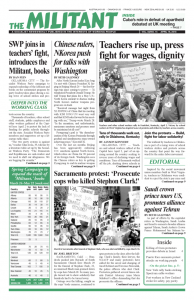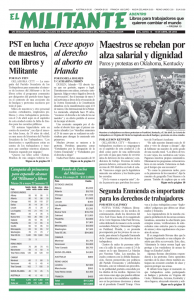NEW YORK — A March 16 meeting here featured leaders of the Federation of Cuban Women (FMC), the National Union of Writers and Artists of Cuba (UNEAC) and the National Union of Cuban Jurists. The event, which drew more than 70 people, was held at the New York State Nurses Association union hall.
“Our mothers and grandmothers told us what things were like for women in Cuba before the revolution,” said FMC representative Maritzel González responding to a question about what gains have been made by women in Cuba in the course of its socialist revolution. “They faced discrimination for being women, poor and for being black,” said González. “All of that came to an end,” she said, explaining that women from the beginning of the revolutionary struggle that overthrew the brutal dictatorship of Fulgencio Batista in 1959 to today “have been involved in the deep social transformations carried out since, not only as beneficiaries but as participants.”
As workers and peasants in Cuba took charge of the country and their own destiny, they took control of factories and carried out a deep land reform that distributed land to peasants. Tens of thousands of women were drawn to these massive mobilizations, including the 1961 campaign that wiped out illiteracy in the country.
During their visit here the Cuban revolutionaries also spoke with students at City College of New York.
Joshua Pendergrass, speaking on behalf of the nurses association, welcomed the delegation to the March 16 event. Juanita Young, a long-time fighter against police brutality, spoke about the visit she and other family members of people killed by the cops made to Cuba in 2016, hosted by the FMC. The meeting, sponsored by the New York-New Jersey Cuba Si Coalition, was chaired by Erin Feely-Nahem and Martín Koppel.
Much of the meeting was devoted to answering questions from the audience on topics ranging from the fight against racism to challenges facing Cuban women today, and the impact of the U.S. economic embargo on Cuba.
“Since the very first days the revolutionary government considered fighting racist discrimination one of the main issues to be addressed,” said Juana Randich, president of the Santiago de Cuba provincial chapter of the National Union of Cuban Jurists. “The revolution has fought this scourge.”
“For us, expanding access to culture is a way of improving the quality of life” of Cuban workers and farmers, said Luis Morlote, speaking of UNEAC’s work.
As examples of the gains made under the revolution they cited the high percentage of women in the workforce, earning equal pay for equal work; full access to abortion; and paid leave for a mother and father to take care of a child for up to one year, with 60 percent of their salary.
“The aim of the FMC has been to increase women’s participation in the political, economic and social life of the country,” said Yaneidys Pérez Cruz, FMC provincial secretary in Las Tunas.
Gail Walker, executive director of IFCO/Pastors for Peace and a co-chair of the National Network on Cuba, gave an update on the upcoming May Day Brigade to Cuba.
The April 22-May 6 brigade, she said, is an opportunity to see the Cuban Revolution firsthand and to be able to speak out more effectively against Washington’s embargo and decadeslong effort to overthrow the revolution.

